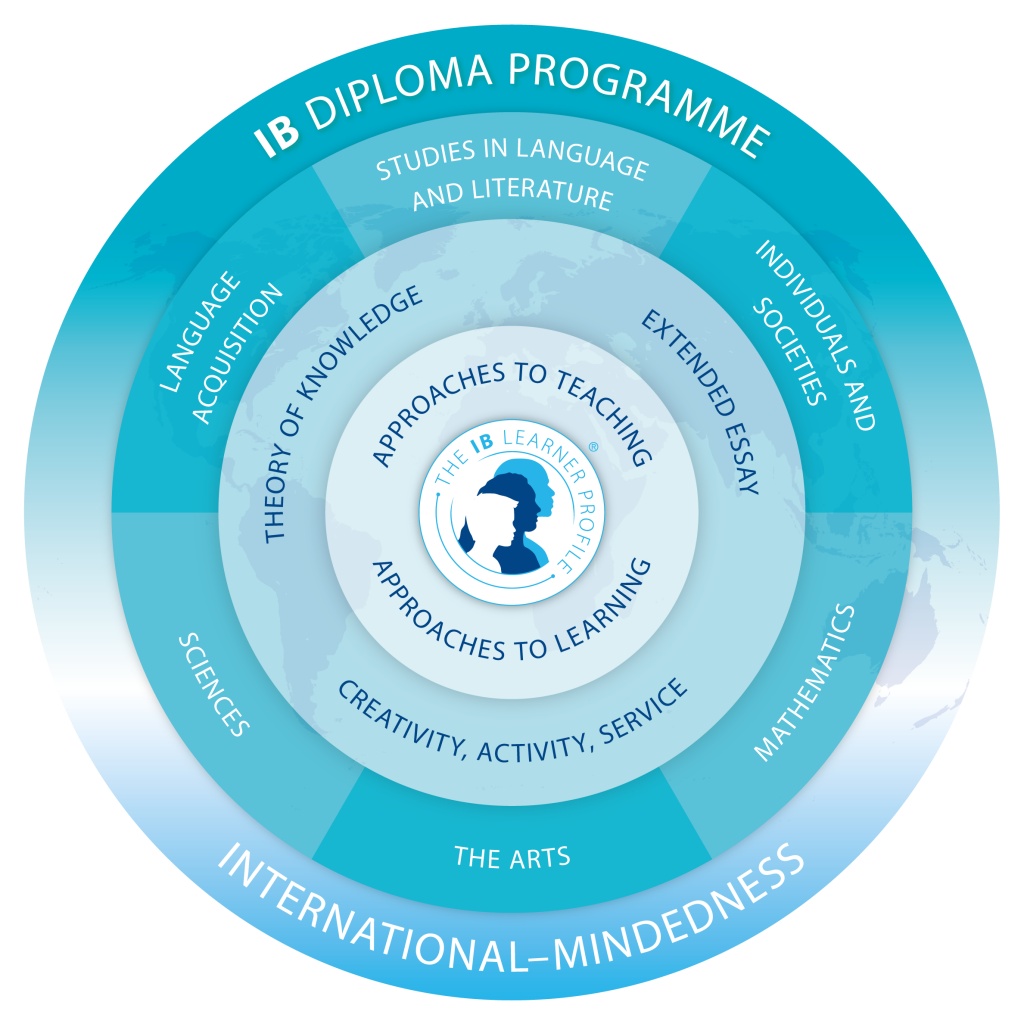The International Baccalaureate® (IB) Diploma Programme (DP) is an assessed program for students in grades 11-12. The DP has been designed to develop the intellectual, social, emotional, and physical well-being of students.
Students can make connections across traditional academic disciplines and explore the nature of knowledge through the program’s unique theory of knowledge course make connections across traditional academic disciplines and the universe. Moreover, DP graduates grow into open-minded and tolerant individuals, who appreciate cultural diversity and respect a range of points of view.
“The aim of all IB programs is to develop internationally minded people who, recognizing their common humanity and shared guardianship of the planet, help to create a better and more peaceful world”.
IB graduates are distinguished by practice-oriented attributes developed throughout the learning process reflected in the IB learner profile. IB learners strive to be: Inquirers, Knowledgeable, Thinkers, Communicators, Principled, Open-minded, Caring, Risk-takers, Balanced, and Reflective.
IB Learner Profile
The International Baccalaureate® (IB) learner profile describes a broad range of human capacities and responsibilities that go beyond academic success.
Diploma Programme has a special status at 1931 universities worldwide. DP students apply to more than 3,300 higher education institutions each year, in close to 90 countries. Newton Free School’s 2023 DP cohort of 20 students received a $2,700,000 scholarship and 80 letters of acceptance from the leading universities in the United States of America, Canada, Great Britain, Germany, the Netherlands, Spain, Italy, Belgium, Austria, the Czech Republic, France, and Hungary.
DP Benefits
The IB is recognized in (almost) every country in the world as excellent preparation for university entry.
- DP students enrol, persist, and graduate at higher rates than the national average in a study about postsecondary outcomes of DP graduates in the United States.
- IB students studying at higher education institutions in the United Kingdom have greater odds of achieving positive higher education outcomes than their A-level peers, according to a study comparing student performance.
- On average, DP alumni reported higher capacities for a variety of 21st-century skills compared to their non-DP counterparts according to a study in Asia-Pacific.
reveal that:
IB students are 40% more likely to achieve a first or upper-second-class degree;
DP students are three times more likely to enrol at a top 20 higher education institution in the UK;
In the US, 62% of DP graduates earned a four-year college degree, compared to 41% of all US students;
In Canada, DP students are much more likely to enter science, technology, engineering, and mathematics (50.1%);
Compared to graduates with traditional high school diplomas in Canada, DP students have significantly higher university grades.
The curriculum is made up of the DP core and six subject groups. The DP core aims to broaden students’ educational experience and challenge them to apply their knowledge and skills. The flexibility of the DP enables students to pursue subjects of strength, while not dropping those they enjoy. The program leaves students in a strong position to enter university or a career of choice – and achieve more when they get there.

DP Core Subjects
The three elements of the DP core, Theory of Knowledge (TOK), the Extended Essay (EE), and Creativity, Activity, Service (CAS) are part of the International Baccalaureate® (IB) Diploma Programme (DP) core, and mandatory for all students.
Theory of Knowledge (TOK)
TOK asks students to reflect on the nature of knowledge, and on how we know what we claim to know. The theory of knowledge encourages critical thinking about knowledge itself and aims to help students make sense of their experiences. The course encourages students to share ideas with others and to listen and learn from what others think.
Creativity, Activity, Service (CAS)
CAS enables students to enhance their personal and interpersonal development by learning through experience. It provides opportunities for self-determination and collaboration with others, fostering a sense of accomplishment and enjoyment from their work. CAS projects challenge students to show initiative, demonstrate perseverance, and develop skills such as collaboration, problem-solving, and decision-making.
Extended Essay (EE)
EE is an independent piece of research, culminating with a 4,000-word paper. EE offers an opportunity for students to investigate a topic of personal interest to them, which relates to one of the student’s six DP subjects. Through the research process for the extended essay, students develop skills in formulating an appropriate research question, engaging in a personal exploration of the topic, communicating ideas, and developing an argument.
DP curriculum consists of 6 subject groups, each containing different courses, including: Studies in language and literature, Language Acquisition, Individuals and societies, Sciences, Mathematics, and Arts.
Subject Groups
At Newton Free School DP curriculum consists of 5 subject groups, each containing different courses.
Studies in language and literature
- Language A: Literature (Georgian)
- Language A: Literature (English)
Language acquisition
- Language B: English
- German ab initio
Mathematics
- Applications and Interpretations
- Analysis and Approaches
Individuals and societies
- History
- Business Management
- Global Politics
Sciences
- Biology
- Chemistry
- Physics
- Computer Science

